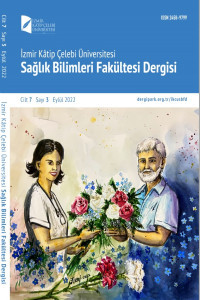Hemşirelikte Psikomotor Becerilerin Öğretiminde Senaryo Temelli Öğrenme: Bir Deneyim Paylaşımı
Hemşirelik, hemşirelik eğitimi, psikomotor beceri
___
- Anderson, LW. (2005). Objectives, evaluation, and the improvement of education. Studies in Educational Evaluation. 31 (2-3): 102-113.
- Bilen, M. (2002). Plandan uygulamaya öğretim. Ankara: Anı yayıncılık.
- Castanelli, DJ. (2009). The rise of simulation in technical skills teaching and the implications for training novices in anaesthesia. Anaesth Intensive Care, 37(6): 903–910.
- Chong, MR., Goff, L., Dej, K. (2012). Undergraduate essay writing: Online and face-to-face peer reviews. Collected Essays on Learning and Teaching, 5: 69-74.
- Güngörmez, HG., Akgün, A., Duruk, Ü. (2016). Senaryo tabanlı öğrenme yoluyla öğrencilerin yansıtıcı düşünme becerilerinin geliştirilmesi. International Journal of Social Science, 48 (2): 459-475.
- Himes, D., Ravert, P., Tingey, C. (2009). Engaging nursing students in the fundamental skill lab: scenario based simulations. Clinical Simulation in Nursing, 5(3): 140-147.
- Jeffries, P. (2015). The NLN Jeffries simulation theory. USA; Lippincott Williams & Wilkins.
- Karadag, M., Çalışkan, N., İşeri, Ö. (2016). Effects of case studies and simulated patients on students’ nursing care plan. Int J Nurs Knowl, 27(2):87-94.
- Karadağ, M., Çalışkan, N., İşeri, Ö. (2015). Simüle hasta kullanımına ilişkin öğrenci görüşleri. Çağdaş Tıp Dergisi, 5(1): 36-44.
- Kolcu, G., Başaran, Ö., Sandal, G., Saygın, M., Aslankoç, R., Baş, FY., vd. (2017). Mesleki beceri eğitim düzeyi: Süleyman Demirel Üniversitesi Tıp Fakültesi deneyimi, Smyrna Tıp Dergisi, 3: 7-14.
- Korhan, E.A., Tokem, Y., Yılmaz, D.U., Dilemek, H. (2016). Hemşirelikte psikomotor beceri eğitiminde video destekli öğretim ve OSCE uygulaması: Bir deneyim paylaşımı. İzmir Kâtip Çelebi Üniversitesi Sağlık Bilimleri Fakültesi Dergisi, 1(1): 35-37.
- Nadolski, RJ., Hummel, HG., Van Den Brink, HJ., Slootmaker, A., Kurvers, HJ., Storm J. (2008). A methodology and toolkit for developing serious games in higher education. Simulation & Gaming, 39(3): 338-352.
- Öncü, S. (2014). Klinik beceri eğitimlerinin değerlendirilmesinde CIPP modeli örneği. Doktora tezi, Ege Üniversitesi, İzmir.
- Özsevgeç, LC., Kocadağ, Y. (2013). Senaryo Tabanlı Öğrenme Yaklaşımının Öğrencilerin Kalıtım Konusundaki Yanılgılarının Giderilmesi Üzerindeki Etkileri. Hacettepe Üniversitesi Eğitim Fakültesi Dergisi, 28(3): 83-96.
- Özsevgeç, T. (2011). Computer literacy of Turkish preservice teachers in different teacher training programs. Asia Pacific Education Review, 12(1): 13-21.
- Sarmasoğlu, S., Dinc, L., Elcin, M. (2016). Hemşirelik öğrencilerinin klinik beceri eğitimlerinde kullanılan standart hasta ve maketlere ilişkin görüşleri. Hemşirelikte Araştırma Geliştirme Dergisi, 13(2): 107-115.
- Şen, H. (2012). Hemşirelikte psikomotor beceri öğretiminde rehber ilkeler: Kalp masajı örneği. Dokuz Eylül Üniversitesi Hemşirelik Yüksekokulu Elektronik Dergisi, 5(4): 180–184.
- Taşpınar, M. (2004). Kuramdan Uygulamaya Öğretim Yöntemleri. Ankara: Nobel Basımevi.
- Terzioğlu, F., Kapucu, S., Özdemir, L., Boztepe, H., Duygulu, S., Tuna, Z., et al. (2012). Nursing students’ opinions about simulation method. Hacettepe Üniversitesi Sağlık Bilimleri Fakültesi Hemşirelik Dergisi, 19(1):16–23.
- Terzioğlu, F., Yücel, Ç., Koç, G., Şimşek, Ş., Yaşar, BN., Şahan, FU., et al. (2016). A new strategy in nursing education: From hybrid simulation to clinical practice. Nurse Education Today, 39: 104–108.
- Tuzer, H., Dinc, L., Elcin, M. (2016). The effects of using high-fidelity simulators and standardized patients on the thorax, lung, and cardiac examination skills of undergraduate nursing students. Nurse Education Today, 45 (2016):120–125.
- Ulric B, Mancini B. Mastering Simulation: A Handbook for Success. In: Teresa NG, Lori L, eds. Creating effective simulation environments. 1st ed. USA: Sigma Theta Tau International; 2013.
- Unver, V., Başak, T., İyigün, E., Taştan, S., Demiralp, M., Yıldız, D., et al. (2013). An evaluation of a course on the rational use of medication in nursing from the perspective of the students. Nurse Education Today, 33(11):1362–1368.
- Uysal, N. (2016). Improvement of nursing students’ learning outcomes through scenario-based skills training. Revista Latino-Americana de Enfermagem, 24 (2790): 1-8.
- Ünver V, Başak T. (2016). Simülasyona dayalı eğitimde senaryo yazma süreci. Türkiye Klinikleri Cerrahi Hemşireliği Özel Sayısı, 2(1):70-78.
- ISSN: 2458-9799
- Yayın Aralığı: Yılda 3 Sayı
- Başlangıç: 2016
- Yayıncı: İzmir Katip Çelebi Üniversitesi
Ayşegül AKSOY GÖKMEN, Hüsniye KAYALAR, Bayram PEKTAŞ, Selçuk KAYA
Bazı Kronik Hastalıklarda Orta Zincirli Yağ Asitlerinin Kullanımı
Aylin BAYINDIR GÜMÜŞ, Hülya YARDIMCI
Kişisel Gelişim Ölçeği-Revize Türkçe Versiyonunun Geçerlik ve Güvenirlik Çalışması
Metotreksata Bağlı Kutanöz Ülserasyonda Levine Koruma Modeli’ne Göre Bakım
Selmin ŞENOL, Seda ARDAHAN SEVGİLİ
İlköğretim Öğrencilerinde Skolyoz Tarama Sonuçları
Medine YILMAZ, Feyza DERELİ, Gamze AĞARTIOĞLU KUNDAKÇI
Yoğun Bakım Ünitelerinde Ağrı Kontrolünde Hemşirenin Rolü
I. ULUSLARARASI İÇ HASTALIKLARI HEMŞİRELİĞİ KONGRESİ ÖZET VE TAM METİN BİLDİRİLERİ
İ. Uluslararasi İç Hastaliklari Hemşireliği Kongresi ÖZET VE TAM METİN BİLDİRİLERİ
Sağlıklı Büyüyen Çocuk Kongresi 2018 Bildiri Özetleri
Sağlıklı Büyüyen Çocuk Kongresi 2018 SAĞLIKLI BÜYÜYEN ÇOCUK KONGRESİ 2018
Hemşirelikte Psikomotor Becerilerin Öğretiminde Senaryo Temelli Öğrenme: Bir Deneyim Paylaşımı
Esra AKIN KORHAN, Derya UZELLI YILMAZ, Burcu CEYLAN, Ayşe AKBIYIK, Yasemin TOKEM
